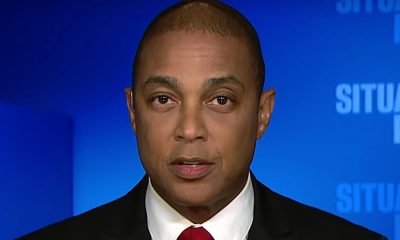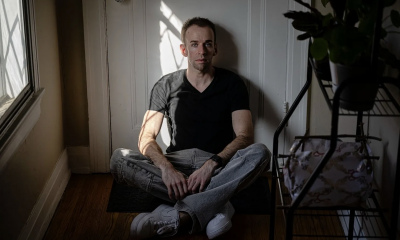National
Mixed reaction to Boy Scouts plan on gay members
Critic says Sandusky would be new ‘poster boy’ for group
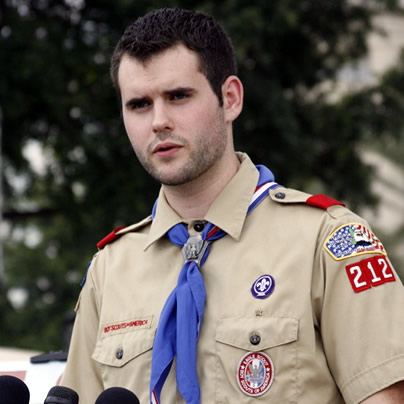
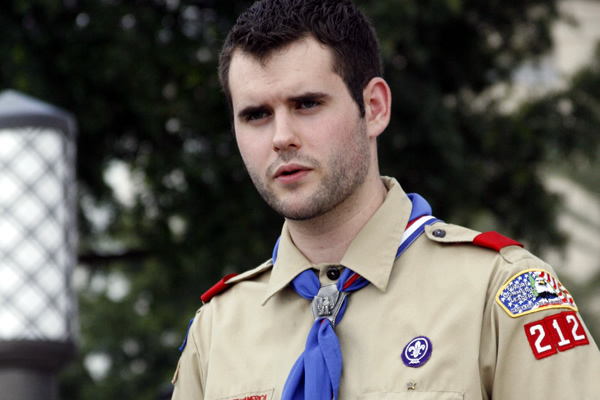
‘This would be an incredible step forward in the right direction,’ said Zach Wahls, an Eagle Scout and founder of the group Scouts for Equality. (Photo courtesy of Change.org)
A statement issued by the Boy Scouts of America on Monday saying the organization is considering dropping its national policy banning gay scouts and scout leaders was hailed by LGBT advocates as an important breakthrough in the fight for equality.
But two of the nation’s leading anti-gay groups warned that if the BSA’s board votes next week to drop its ban on gays, as predicted by sources familiar with the Boy Scouts, it would lead to a “mass exodus” of scouts and scout leaders from traditional, religious-oriented families and communities.
In its statement released on Monday, the BSA said the change it was considering would allow the religious, civic and educational organizations that are chartered to operate scouting units throughout the country to make the final decision on whether or not to accept gays.
“Currently, the BSA is discussing potentially removing the national membership restriction regarding sexual orientation,” the statement says.
“This would mean there would no longer be any national policy regarding sexual orientation, and the chartered organizations that oversee and deliver Scouting would accept membership and select leaders consistent with each organization’s mission, principles, or religious beliefs,” says the statement.
“BSA members and parents would be able to choose a local unit that best meets the needs of their families,” it says.
NBC News, which first reported that BSA was considering lifting its gay ban prior to the release of the statement, also reported that the organization was expected to approve the changes at a board of directors meeting within the next week.
Janelle Moritz, a public relations representative for the Boy Scouts of America, told the Blade she could not confirm the NBC report about the timing of a board meeting or what the board would decide. She said BSA would not comment on the matter beyond what it said in its statement, which doesn’t say when the group will decide on the issue.
Other news media outlets, however, reported that BSA sources confirmed that the board meeting would take place next week, mostly likely at the BSA national headquarters in Irving, Texas.
“The Boy Scouts of America have heard from scouts, corporations, and millions of Americans that discriminating against gay scouts and scout leaders is wrong,” said Herndon Graddick, president of the Gay and Lesbian Alliance Against Defamation. “Scouting is a valuable institution and this change will only strengthen its core principles of fairness and respect,” he said.
“This would be an incredible step forward in the right direction,” said Zach Wahls, an Eagle Scout and founder of the group Scouts for Equality. “We look forward to working with BSA Councils and chartering organizations across the country to end the exclusion of our gay brothers in scouting, as well as the gay and lesbian leaders who serve the organizations so well.”
Chad Griffin, president of the Human Rights Campaign, said the Boy Scouts’ expected policy change follows the growing support for LGBT equality from the American people.
“The pulse of equality is strong in America, and today it beats a bit faster with news that the Boy Scouts may finally put an end to its long history of discrimination,” Griffin said in a statement. “Our nation and its leaders respect lesbian, gay, bisexual and transgender citizens, and it’s time the Boy Scouts echo those values.”
A far different response emerged from leaders of the Family Research Council and the American Family Association, two national conservative groups that oppose LGBT rights.
“The Boy Scouts of America board would be making a serious mistake to bow to the strong-arm tactics of LGBT activists and open the organization to homosexuality,” said FRC President Tony Perkins in a statement.
“The mission of the Boy Scouts is to ‘instill values in young people’ and ‘prepare them to make ethical choices,’ and the Scouts’ oath includes a pledge ‘to do my duty to God’ and keep himself ‘morally straight,” he said. “It is entirely reasonable and not at all unusual for those passages to be interpreted as requiring abstinence from homosexual conduct.”
The American Family Associated posted on its website a column by anti-gay advocate Bryan Fischer, who quipped that Jerry Sandusky, the former Penn State assistant coach convicted on child molestation charges, would become “the new poster boy” for the Boy Scouts.
“This move, unless the BSA dramatically reverses itself in the immediate future, represents the capitulation to the forces of sexual deviancy,” he said. “The Scouts will have made a deliberate decision to put the sexual integrity of every young man in their care at risk.”
Within a day of the BSA’s announcement that it was considering changing its policy on gay scouts and scout leaders, the FRC and the American Family Association posted appeals on their websites urging members and supporters to call the BSA to urge the group to leave its ban on gays in place.
“As the BSA board meets next week, it is crucial that they hear from those who stand with them and their current policy regarding homosexuality,” FRC said.
Possibly in anticipation of strong opposition by conservative and religious groups, the BSA emphasized in its own statement that the change would allow local units to decide whether or not to admit gays.
“The Boy Scouts would not, under any circumstances, dictate a policy to units, members, or parents,” the statement says. “Under this proposed policy, the BSA would not require any chartered organization to act in ways inconsistent with that organization’s mission, principles or religious beliefs.”
The BSA website says more than 100,000 scouting units are owned and operated by independent chartered organizations.
“Of these, 64.9 percent of all units are chartered to faith-based organizations, 22.7 percent of all units are chartered to civic organizations, and 7.9 percent of all units are chartered to educational organizations,” it says.
It says the chartered organizations are responsible for providing meeting facilities, providing “quality leadership for the scouting unit,” and appointing a representative to coordinate unit operations
A list of BSA chartered organizations posted on its website shows a wide range of religious and civic groups that are likely to differ on whether or not to admit gay scouts and scout leaders.
Among them are the Catholic Church, the Church of Jesus Christ of Latter-day Saints, and “Baptist Churches,” which traditionally have condemned homosexuality. Others, however, include the United Church of Christ, the Episcopal Church, United Methodist Church and Lutheran churches, which have had more accepting policies toward LGBT people.
Civic groups listed on the BSA website as chartered organizations include local Chambers of Commerce, Lions and Rotary clubs, American Legion organizations, Boys’ and Girls’ Clubs, YMCA groups, “non-profit agencies,” and “home owners” groups.
The BSA’s statement saying it is considering removing its national policy banning gay scouts and scout leaders comes seven months after the BSA announced it had conducted a two-year review of the ban and decided to leave it in place.
Monday’s announcement also comes after several prominent corporations, including United Parcel Service and Intel Corporation, withdrew as BSA financial sponsors, saying the gay ban violated their corporate polices of non-discrimination based on sexual orientation.
Others opposing the Boy Scouts ban on gays have organized online petition drives that have gathered hundreds of thousands of signatures calling on the BSA to drop its gay ban.
Among those drawing attention to efforts to end the ban is Eagle Scout Wahls of Iowa, who is straight but has spoken publically about his two lesbian moms.
http://www.youtube.com/watch?v=Rrsn33RstKI
Sharon Brackett, co-founder and board chair of the statewide transgender advocacy organization Gender Rights Maryland, said she experienced firsthand how at least some Boy Scout troops and the chartered organizations that operate them are LGBT supportive.
Brackett said she served as a scout master for the local Boy Scout troop in Savage, Md., where her sons were members, before she transitioned from male to female. She said after taking a break during her transition period, the troop and a local Methodist church that served as the chartered organization, welcomed her back once she completed her gender transition.
“My experience has been positive,” she said, noting that women have long served as Boy Scout troop leaders and officials in the chartered organization covering her area had no problem with her coming back.
Brackett said she supports the proposed change by the BSA to leave it up to the chartered organizations to decide whether gay scouts or troops can be admitted. At least in Maryland, she said, there are enough local troops and chartered organizations to choose from that would result in gay youth finding one that will be welcoming.
“Having that choice is the best next step for us at this time,” she said.
Florida
AIDS Healthcare Foundation sues Fla. over ‘illegal’ HIV drug program cuts
Tens of thousands could lose access to medications

Following the slashing of hundreds of thousands of dollars from Florida’s AIDS Drug Assistance Program, AIDS Healthcare Foundation filed a lawsuit against the Florida Department of Health over what it says was an illegal change to income eligibility thresholds for the lifesaving program.
The Florida Department of Health announced two weeks ago that it would make sweeping cuts to ADAP, dramatically changing how many Floridians qualify for the state-funded medical coverage — without using the formal process required to change eligibility rules. As a result, AHF filed a petition Tuesday in Tallahassee with the state’s Division of Administrative Hearings, seeking to prevent more than 16,000 Floridians from losing coverage.
The medications covered by ADAP work by suppressing HIV-positive people’s viral load — making the virus undetectable in blood tests and unable to be transmitted to others.
Prior to the eligibility change, the Florida Department of Health covered Floridians earning up to 400 percent of the federal poverty level — or $62,600 annually for an individual. Under the new policy, eligibility would be limited to those making no more than 130 percent of the federal poverty level, or $20,345 per year.
The National Alliance of State and Territorial AIDS Directors estimates that more than 16,000 patients in Florida will lose coverage under the state’s ADAP because of this illegal change in department policy. Florida’s eligibility changes would also eliminate access to biktarvy, a widely used once-daily medication for people living with HIV/AIDS.
Under Florida law, when a state agency seeks to make a major policy change, it must either follow a formal rule-making process under the Florida Administrative Procedure Act or obtain direct legislative authorization.
AHF alleges the Florida Department of Health did neither.
Typically, altering eligibility for a statewide program requires either legislative action or adherence to a multistep rule-making process, including: publishing a Notice of Proposed Rule; providing a statement of estimated regulatory costs; allowing public comment; holding hearings if requested; responding to challenges; and formally adopting the rule. According to AHF, none of these steps occurred.
“Rule-making is not a matter of agency discretion. Each statement that an agency like the Department of Health issues that meets the statutory definition of a rule must be adopted through legally mandated rule-making procedures. Florida has simply not done so here,” said Tom Myers, AHF’s chief of public affairs and general counsel. “The whole point of having to follow procedures and rules is to make sure any decisions made are deliberate, thought through, and minimize harm. Floridians living with HIV and the general public’s health are at stake here and jeopardized by these arbitrary and unlawful DOH rule changes.”
AHF has multiple Ryan White CARE Act contracts in Florida, including four under Part B, which covers ADAP. More than 50 percent of people diagnosed with HIV receive assistance from Ryan White programs annually.
According to an AHF advocacy leader who spoke with the Washington Blade, the move appears to have originated at the state level rather than being driven by the federal government — a claim that has circulated among some Democratic officials.
“As far as we can tell, Congress flat-funded the Ryan White and ADAP programs, and the proposed federal cuts were ignored,” the advocacy leader told the Blade on the condition of anonymity. “None of this appears to be coming from Washington — this was initiated in Florida. What we’re trying to understand is why the state is claiming a $120 million shortfall when the program already receives significant federal funding. That lack of transparency is deeply concerning.”
Florida had the third-highest rate of new HIV infections in the nation in 2022, accounting for 11 percent of new diagnoses nationwide, according to KFF, a nonprofit health policy research organization.
During a press conference on Wednesday, multiple AHF officials commented on the situation, and emphasized the need to use proper methods to change something as important as HIV/AIDS coverage availability in the sunshine state.
“We are receiving dozens, hundreds of calls from patients who are terrified, who are confused, who are full of anxiety and fear,” said Esteban Wood, director of advocacy, legislative affairs, and community engagement at AHF. “These are working Floridians — 16,000 people — receiving letters saying they have weeks left of medication that keeps them alive and costs upwards of $45,000 a year. Patients are asking us, ‘What are we supposed to do? How are we supposed to survive?’ And right now, we don’t have a good answer.”
“This decision was not done in the correct manner. County health programs, community-based organizations, providers across the state — none of them were consulted,” Wood added. “Today is Jan. 28, and we have just 32 days until these proposed changes take effect. Nearly half of the 36,000 people currently on ADAP could be disenrolled in just over a month.”
“Without this medication, people with HIV get sicker,” Myers said during the conference. “They end up in emergency rooms, they lose time at work, and they’re unable to take care of their families. Treatment adherence is also the best way to prevent new HIV infections — people who are consistently on these medications are non-infectious. If these cuts go through, you will have sicker people, more HIV infections, and ultimately much higher costs for the state.”
“Patients receiving care through Ryan White and ADAP have a 91 percent viral suppression rate, compared to about 60 percent nationally,” the advocacy leader added. “That’s as close to a functional cure as we can get, and it allows people to live healthy lives, work, and contribute to their communities. Blowing a hole in a program this successful puts lives at risk and sets a dangerous precedent. If Florida gets away with this, other states facing budget pressure could follow.”
The lawsuit comes days after the Save HIV Funding campaign pressed Congress to build bipartisan support for critical funding for people living with or vulnerable to HIV. In May of last year, President Donald Trump appeared to walk back his 2019 pledge to end HIV as an epidemic, instead proposing the elimination of HIV prevention programs at the Centers for Disease Control and Prevention and housing services in his budget request to Congress.
House appropriators, led by the Republican majority, went further, calling for an additional $2 billion in cuts — including $525 million for medical care and support services for people living with HIV.
While Senate appropriators ultimately chose to maintain level funding in their version of the spending bills, advocates feared final negotiations could result in steep cuts that would reduce services, increase new HIV infections, and lead to more AIDS-related deaths. The final spending package reflected a best-case outcome, with funding levels largely mirroring the Senate’s proposed FY26 allocations.
“What the state has done in unilaterally announcing these changes is not following its own rules,” Myers added. “There is a required process — rule-making, notice and comment, taking evidence — and none of that happened here. Before you cut 16,000 people off from lifesaving medication, you have to study the harms, ask whether you even have the authority to do it, and explore other solutions. That’s what this lawsuit is about.”
National
Federal authorities arrest Don Lemon
Former CNN anchor taken into custody two weeks after Minn. church protest
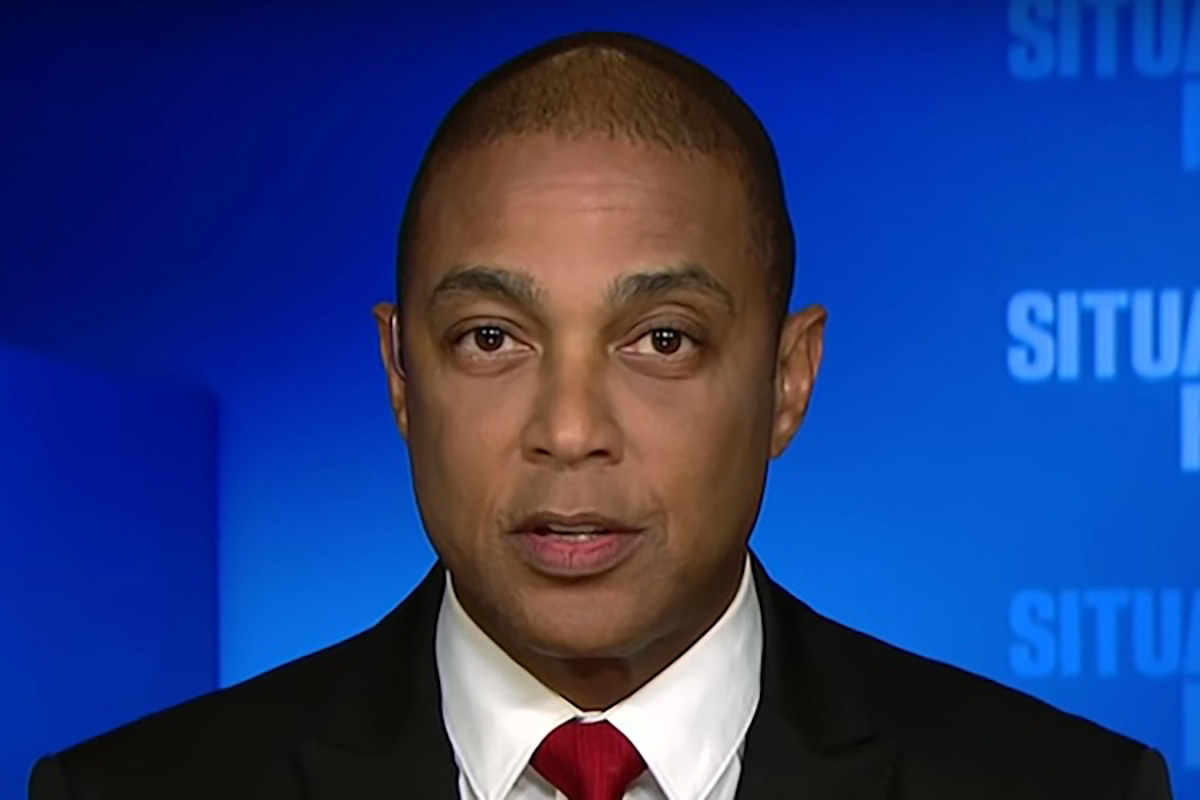
Federal authorities on Thursday arrested former CNN anchor Don Lemon in Los Angeles.
CNN reported authorities arrested Lemon after 11 p.m. PT while in the lobby of a hotel in Beverly Hills, Calif., while he “was leaving for an event.” Lemon’s lawyer, Abbe Lowell, in a statement said his client was in Los Angeles to cover the Grammy Awards.
Authorities arrested Lemon less than two weeks after he entered Cities Church in St. Paul, Minn., with a group of protesters who confronted a pastor who works for U.S. Immigration and Customs Enforcement. (An ICE agent on Jan. 7 shot and killed Renee Good, a 37-year-old Minneapolis woman who left behind her wife and three children. U.S. Customs and Border Protection agents on Jan. 24 shot and killed Alex Pretti, a 37-year-old nurse who worked for the Department of Veterans Affairs, in Minneapolis.)
Lemon insists he was simply covering the Cities Church protest that interrupted the service. A federal magistrate last week declined to charge the openly gay journalist in connection with the demonstration.
“Don Lemon was taken into custody by federal agents last night in Los Angeles, where he was covering the Grammy awards,” said Lowell in his statement. “Don has been a journalist for 30 years, and his constitutionally protected work in Minneapolis was no different than what he has always done. The First Amendment exists to protect journalists whose role it is to shine light on the truth and hold those in power accountable.”
“Instead of investigating the federal agents who killed two peaceful Minnesota protesters, the Trump Justice Department is devoting its time, attention and resources to this arrest, and that is the real indictment of wrongdoing in this case,” Lowell added. “This unprecedented attack on the First Amendment and transparent attempt to distract attention from the many crises facing this administration will not stand. Don will fight these charges vigorously and thoroughly in court.”
Attorney General Pam Bondi on X confirmed federal agents “at my direction” arrested Lemon and three others — Trahern Jeen Crews, Georgia Fort, and Jamael Lydell Lundy — “in connection with the coordinated attack on Cities Church in St. Paul, Minnesota.”
Fort is also a journalist.
At my direction, early this morning federal agents arrested Don Lemon, Trahern Jeen Crews, Georgia Fort, and Jamael Lydell Lundy, in connection with the coordinated attack on Cities Church in St. Paul, Minnesota.
More details soon.
— Attorney General Pamela Bondi (@AGPamBondi) January 30, 2026
Lemon, who CNN fired in 2023, is expected to appear in court in Los Angeles on Friday.
“Freedom of the press is a cornerstone of a free society; it is the tool by which Americans access the truth and hold power to account. But Donald Trump and Pam Bondi are at war with that freedom — and are threatening the fundamentals of our democracy,” said Human Rights Campaign President Kelley Robinson on Friday in a statement. “Don Lemon and Georgia Fort were doing their jobs as reporters. Arresting them is not law enforcement it is an attack on the Constitution at a moment when truthful reporting on government power has never been more important. These are the actions of a despot, the tactics of a dictator in an authoritarian regime.”
The White House
Expanded global gag rule to ban US foreign aid to groups that promote ‘gender ideology’
Activists, officials say new regulation will limit access to gender-affirming care

The Trump-Vance administration has announced it will expand the global gag rule to ban U.S. foreign aid for groups that promote “gender ideology.”
Deputy Secretary of State Christopher Landau in a memo, titled Combating Gender Ideology in Foreign Assistance, the Federal Register published on Jan. 27 notes “previous administrations … used” U.S. foreign assistance “to fund the denial of the biological reality of sex, promoting a radical ideology that permits men to self-identify as women, indoctrinate children with radical gender ideology, and allow men to gain access to intimate single-sex spaces and activities designed for women.”
“Efforts to eradicate the biological reality of sex fundamentally attack women by depriving them of their dignity, safety, and well-being. It also threatens the wellbeing of children by encouraging them to undergo life-altering surgical and chemical interventions that carry serious risks of lifelong harms like infertility,” reads the memo. “The erasure of sex in language and policy has a corrosive impact not just on women and children but, as an attack on truth and human nature, it harms every nation. It is the purpose of this rule to prohibit the use of foreign assistance to support radical gender ideology, including by ending support for international organizations and multilateral organizations that pressure nations to embrace radical gender ideology, or otherwise promote gender ideology.”
President Donald Trump on Jan. 28, 2025, issued an executive order — Protecting Children from Chemical and Surgical Mutilation — that banned federal funding for gender-affirming care for minors.
President Ronald Reagan in 1985 implemented the global gag rule, also known as the “Mexico City” policy, which bans U.S. foreign aid for groups that support abortion and/or offer abortion-related services.
Trump reinstated the rule during his first administration. The White House this week expanded the ban to include groups that support gender-affirming care and diversity, equity, and inclusion programs.
The expanded global gag rule will take effect on Feb. 26.
“None of the funds made available by this act or any other Act may be made available in contravention of Executive Order 14187, relating to Protecting Children From Chemical and Surgical Mutilation, or shall be used or transferred to another federal agency, board, or commission to fund any domestic or international non-governmental organization or any other program, organization, or association coordinated or operated by such non-governmental organization that either offers counseling regarding sex change surgeries, promotes sex change surgeries for any reason as an option, conducts or subsidizes sex change surgeries, promotes the use of medications or other substances to halt the onset of puberty or sexual development of minors, or otherwise promotes transgenderism,” wrote Landau in his memo.
Landau wrote the State Department “does not believe taxpayer dollars should support sex-rejecting procedures, directly or indirectly for individuals of any age.”
“A person’s body (including its organs, organ systems, and processes natural to human development like puberty) are either healthy or unhealthy based on whether they are operating according to their biological functions,” reads his memo. “Organs or organ systems do not become unhealthy simply because the individual may experience psychological distress relating to his or her sexed body. For this reason, removing a patient’s breasts as a treatment for breast cancer is fundamentally different from performing the same procedure solely to alleviate mental distress arising from gender dysphoria. The former procedure aims to restore bodily health and to remove cancerous tissue. In contrast, removing healthy breasts or interrupting normally occurring puberty to ‘affirm’ one’s ‘gender identity’ involves the intentional destruction of healthy biological functions.”
Landau added there “is also lack of clarity about what sex-rejecting procedures’ fundamental aims are, unlike the broad consensus about the purpose of medical treatments for conditions like appendicitis, diabetes, or severe depression.”
“These procedures lack strong evidentiary foundations, and our understanding of long-term health impacts is limited and needs to be better understood,” he wrote. “Imposing restrictions, as this rule proposes, on sex-rejecting procedures for individuals of any age is necessary for the (State) Department to protect taxpayer dollars from abuse in support of radical ideological aims.”
Landau added the State Department “has determined that applying this rule to non-military foreign assistance broadly is necessary to ensure that its foreign assistance programs do not support foreign NGOs and IOs (international organizations) that promote gender ideology, and U.S. NGOs that provide sex-rejecting procedures, and to ensure the integrity of programs such as humanitarian assistance, gender-related programs, and more, do not promote gender ideology.”
“This rule will also allow for more foreign assistance funds to support organizations that promote biological truth in their foreign assistance programs and help the (State) Department to establish new partnerships,” he wrote.
The full memo can be found here.
Council for Global Equality Senior Policy Fellow Beirne Roose-Snyder on Wednesday said the expansion of the so-called global gag rule will “absolutely impact HIV services where we know we need to target services, to that there are non-stigmatizing, safe spaces for people to talk through all of their medical needs, and being trans is really important to be able to disclose to your health care provider so that you can get ARVs, so you can get PrEP in the right ways.” Roose-Snyder added the expanded ban will also impact access to gender-affirming health care, food assistance programs and humanitarian aid around the world.
“This rule is not about gender-affirming care at all,” she said during a virtual press conference the Universal Access Project organized.
“It is about really saying that if you want to take U.S. funds — and it’s certainly not about gender-affirming care for children — it is if you want to take U.S. funds, you cannot have programs or materials or offer counseling or referrals to people who may be struggling with their gender identity,” added Roose-Snyder. “You cannot advocate to maintain your country’s own nondiscrimination laws around gender identity. It is the first place that we’ve ever seen the U.S. government define gender-affirming care, except they call it something a lot different than that.”
The Congressional Equality Caucus, the Democratic Women’s Caucus, the Congressional Hispanic Caucus, the Congressional Asian and Pacific American Caucus, and the Congressional Black Caucus also condemned the global gag rule’s expansion.
“We strongly condemn this weaponization of U.S. foreign assistance to undermine human rights and global health,” said the caucuses in a statement. “We will not rest until we ensure that our foreign aid dollars can never be used as a weapon against women, people of color, or LGBTQI+ people ever again.”
-

 LGBTQ Non-Profit Organizations5 days ago
LGBTQ Non-Profit Organizations5 days agoTask Force urges renewed organizing amid growing political threats
-

 Federal Government5 days ago
Federal Government5 days agoTop Democrats reintroduce bill to investigate discrimination against LGBTQ military members
-

 Virginia5 days ago
Virginia5 days agoFrom the Pentagon to politics, Bree Fram fighting for LGBTQ rights
-

 National5 days ago
National5 days agoGay men, ketamine, and trauma. A therapy or a trap?





